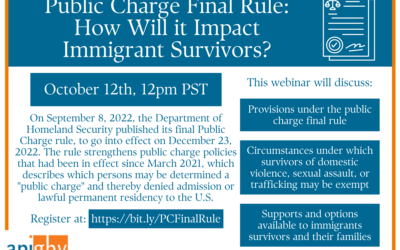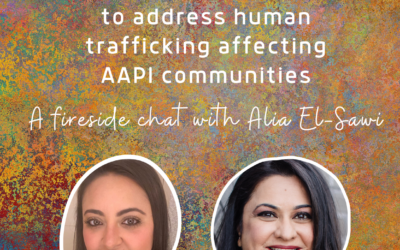Recent policy proposals call for increased entanglement between immigration enforcement and state and local police, which undermines existing protections for domestic violence and sexual assault survivors. This will reduce the likelihood of immigrant victims or witnesses reporting crimes and create unprecedented fear for immigrant families and communities. The reports presented in this document illustrate these problems.
Related Resources
Safeguard Asylum for Survivors – Tell Your Senator to Reject the Emergency National Security Supplemental Appropriations
February 5, 2024 On Sunday night, Senate negotiators released the text of the “Emergency National Security Supplemental Appropriations Act, 2024,” legislation intended to address defense funding and border security concerns. Unfortunately, this funding bill includes...
UPDATED Advisory: Are Victim Services Programs Liable for Criminal “Harboring” When they Work with Immigrant Survivors of Crime? 2022
This Advisory answers common questions about providing shelter and other program services to undocumented victims, describes the law and federal policy, and proposes best practices for programs
How Do Recent ‘Public Charge’ Policy Changes Impact Immigrant Survivors of Crime?
The Department of Homeland Security (DHS) is proposing a new rule that put longstanding policy about the meaning and application of the “public charge” provisions of immigration law into regulation form. This advisory describes provisions under this new proposed rule and how it will impact immigrant survivors of violence, particularly in light of the pandemic.
Public Charge Final Rule: How Will It Impact Immigrant Survivors?
10/12/22 at 12:00 - 1:00pm PSTOn September 8, 2022, the Department of Homeland Security (DHS) published its final Public Charge rule, to go into effect on December 23, 2022. The rule strengthens public charge policies that had been in effect since March 2021, which...
API-GBV Welcomes Protections For Immigrant Survivors Under the Final Public Charge Rule
September 8, 2022 This morning, the U.S. Department of Homeland Security (DHS) published its final Public Charge rule. The final rule will be published in the Federal Register for public inspection tomorrow, September 9th and will go into effect December 23rd....
PowerfuL Partnerships: Collaborative efforts to address human trafficking affecting AAPI communities, 2022
Alia El-Sawi, a Victim Assistance Specialist at the Department of Homeland Security, joins API-GBV for our first “fireside chat” hosted by our Executive Director Monica Khant. Drawing also from her previous role as the Anti-Human Trafficking Coordinator at a community-based organization that provides culturally-responsive services for survivors of human trafficking, Alia will discuss what can be done to increase coordination and communication between DHS agents and community-based advocates in responding to trafficking situations and minimizing trauma for survivors. The conversation will also illuminate challenges to current anti-trafficking efforts, including fear of reporting, human-trafficking’s concurrence with other forms of gender-based violence, and the abundant stereotypes around the trafficking of AAPI individuals.


